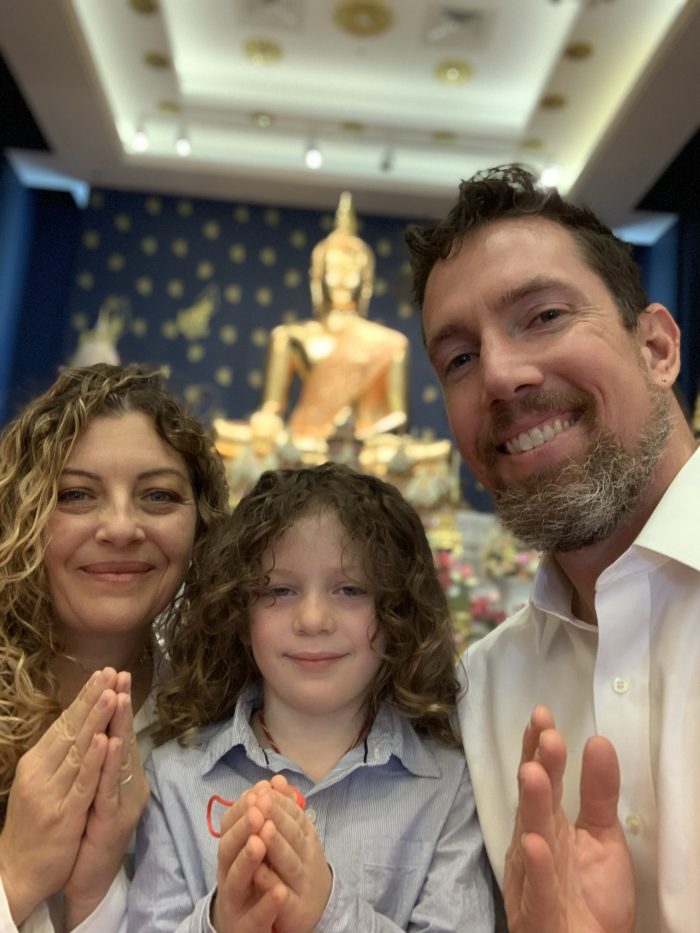Upon waking, sit up and settle your attention inwards, bring to mind the Triple Gem, and proceed to chant the “Namo Tassa Bhagavato Arahato Sammā Sambuddhassa” verse three times. Then, take a moment to reflect on what we can call the “Three Universal Facts of Life”:
- Take good care of your health.
- Make an honest living. Live an honest life.
- Accumulate virtue – pāramī – aka, do some good deeds
We have this great fortune of a precious human birth. Reflecting often on these Three Universal Facts of Life, can help bring things into perspective and help orientate us towards figuring out our life goals. As we grow and dedicate time for study, reflection, practice, and training ourselves properly, we just need to keep going. Be gentle with ourselves and each other. And put in the work, even when it seems like it doesn’t matter.
Before bed chant the “Namo Tassa Bhagavato Arahato Sammā Sambuddhassa” verse three times. Then take a moment to recite some Daily Aspirations, or Resolutions to Live By. Here’s a list of some that hopefully resonate with you. If not, make up your own.
- We must eventually become our own refuge
- There is benefit to giving back to your Parents. Take good care of them and see to their comfort and well-being.
- I practice what I preach. I upkeep my faith and practice. When I directly experience the truth of it and live it in my everyday life, I will know it.
- “May the energetic power of these aspirations guide me towards experiencing the Path and Fruit of Nirvana.
Finish by saying: “Nippāna Pajayo Hotu.” Get some good sleep. Hope this helps, as I know it’s helped millions in the East.
SOME BACKGROUND INFO ON THE CHANTING:
“Namo Tassa Bhagavato Arahato Sammā Sambuddhassa” is a customary preliminary chant that can be recited by itself or as a precursor to other chants. Essentially, it is a verbal practice wherein one is giving respects and honoring to their teacher, which they feel is someone whom has given them the know-how and knowledge of how make the most out of life and how to use it as a wholesome practice.
It is usually literally translated as:
“Homage to That Being, the Blessed One, the Worthy Lord, the Fully Self-Enlightened/Awakened One”
Namo refers to Homage, Lowering oneself in reverence and respect
Tassa ‘to That Being’
Bhagavato (skt. Bhagavan) in this context / tradition refers to one who is Great, Holy, Blessed, a Lord among humankind.
Arahato refers to Purity, in body speech and mind; pure, removed and free from delusion, disillusionment, anger, greed, lust, jealousy, inferior states of mind; because of that purity, they are Worthy of being a teacher, listened to, their teachings considered/contemplated over, and of having those teachings be tested in practice.
Sammā refers to something being Correct, Proper, Right (not relative, but as an absolute)
SamBuddhassa are two words together: ‘Sam’ means oneself, by oneself (not given by some other being or entity, and by another power). ‘Buddhassa’ refers to True Knowledge, Awakening, Enlightenment. ‘Sambuddhassa’ refers to one who has attained Awakening / Clear Penetrating Sight / Knowing / Absolute Truth by themselves, as a result of their own efforts.
To put in different terms: “I pay Homage, to That Being, Blessed and Holy as a result of their wholesomely dedicated efforts and accomplishments, One who is Worthy to be called a Lord due to purification of mind, speech, and body in the ultimate absolute degree, and has trained themselves over uncountable lifetimes until, as a result of their own efforts, forbearance, and striving has Finally and Fully Awakened to the discovery and Enlightenment of the ultimate truth and reality that lies within (i.e. was not bestowed upon them by some exterior supreme being or deity).
Traditionally and practically, this refers to what we know as a Buddha, ‘One who has Awoken’.
‘Nippāna Pajayo Hotu‘ is a kind of Buddhist ‘Amen‘, meant to seal the words or practice and direct them towards the attainment of Nippāna (Sanskrit: Nirvāṇa)


 Share on bsky
Share on bsky





Read 0 comments and reply